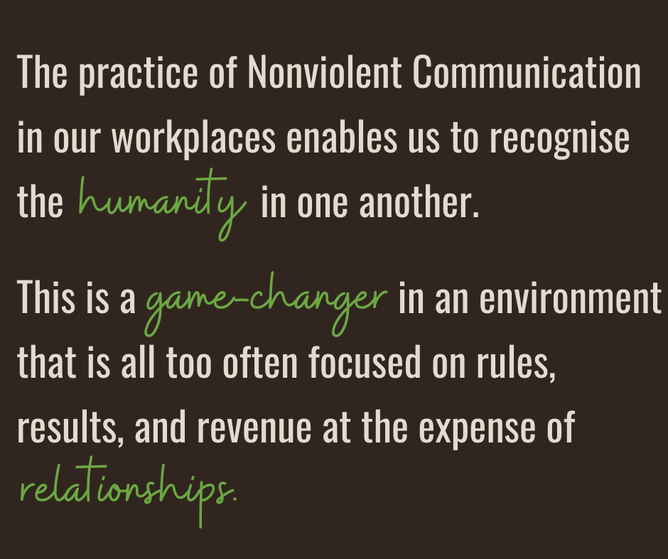When Satya Nadella took over Microsoft in 2014, he set out to transform the company’s infamous toxic culture of hostility, infighting, and backstabbing. To start, he gave each member of his senior leadership team a copy of the book “Nonviolent Communication” by Marshall Rosenberg, Ph.D.
At its core, all communication is about connection. In a business environment, connection can be encapsulated by the Maori concept of Kotahitanga - unity and co-operation towards a common goal.
The practice of Nonviolent Communication (NVC) in our workplaces enables us to recognise the humanity in one another. This is a game-changer in an environment that is all too often focused on rules, results, and revenue, at the expense of relationships.
NVC provides a framework through which to foster this connection. This creates a work environment in which:
- People feel heard and understood
- Team members feel safe to share their thoughts, questions, opinions, and ideas
- Employees and management organically focus on ways to improve work culture and increase productivity
Nonviolent Communication Can Transform Your Workplace
Let’s be honest, you are in business to make money. You might want to change lives and make the world a better place but you need money to do that. And your team is integral to making that happen.
When each member of your workforce knows that they are valued and supported, they will be motivated to give their best in helping the company meet its goals.
Here are some of the ways that NVC can transform your workplace:
Culture of Respect
- All team members are equipped with the skills to effectively express their needs.
- There is an understanding that all needs are valued and can be met through collaboration.
- A powerful shift occurs from blame and shame towards co-operation and collaboration.
- Workplace politics is transformed into a culture of respect in which each person is valued for their contribution.
- Employees feel validated and are more likely to show initiative and creativity.
Clear Communication
Clear communication has very measurable results in a workplace:
- Demands are transformed into requests.
- Requests are clear, asking for what you need (not what you don’t). Clear instructions and guidelines reduce frustration and improve productivity.
- Feedback is meaningful. This is so important. For example, instead of complimenting a team member by saying “Great job!”, think about how what they did met your needs. “I really appreciate the thought you put into the new workflow systems, our efficiency has increased by 20% already!”
- Team members develop effective listening skills. These include the power of questions to ensure genuine understanding and prevent costly miscommunication.
Conflict Resolution
- Using the principles of NVC, people learn how to tune into the feelings and needs that may be motivating a person’s behaviour, rather than focusing on what is “wrong” with him or her.
- All team members gain the skills to initiate meaningful conversations that get to the root of an issue.
- This new understanding allows people to transform a potential confrontation into a productive conversation.
- This leads to genuine collaboration with the shared goal of problem-solving and conflict resolution.
We have seen Nonviolent Communication completely transform businesses with increased team morale, productive collaboration, and lower staff turnover.
If you would like to see these results in your workplace, contact us today to schedule a workshop.
Order your copy of Nonviolent Communication by Marshall Rosenberg, Ph.D




